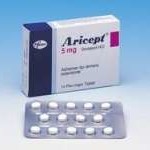 A consumer watchdog group that has pressed the Food and Drug Administration to remove the highest dose of an Alzheimer’s disease drug from the market says the agency has rejected its request.
A consumer watchdog group that has pressed the Food and Drug Administration to remove the highest dose of an Alzheimer’s disease drug from the market says the agency has rejected its request.
Public Citizen has announced that the FDA declined to withdraw the 23-milligram dose of Aricept, made by Japan’s Eisai Co. Lt, following a lawsuit filed against the agency.
Public Citizen sought the ban on the 23mg due to high rates of toxicity and also wanted the agency to warn doctors and patients against the 20mg – or combining the 5mg and 10mg pills. Aricept was approved for patients with moderate to severe Alzheimer’s. However, the FDA maintains that, given the few Alzheimer’s treatments available, a physician may decide the added side effects justify the benefits.
The consumer advocacy group first petitioned the agency over the drug in May 2011, saying the high dose has more dangerous, potentially deadly side effects including vomiting, which in Alzheimer’s patients “can lead to pneumonia, massive gastrointestinal bleeding, esophageal rupture or death.”
The petition argued that the only clinical trial submitted to the FDA for approval of the 23mg dose compared it to the 10mg dose, but failed to prove the higher dose was more effective. And in three of four tests, there was no significant difference between the doses on a cognitive or functional level.
At the same time, the petition maintained the 23mg dose increased side effects such as a slowed pulse rate, nausea, vomiting, diarrhea, urinary incontinence, fatigue, dizziness, agitation, confusion and anorexia compared with the 10mg dose.
In September the group filed a lawsuit in federal court to compel the agency to respond to the petition. The agency denied the request in a letter sent to the group on November 6, 2012.
“Allowing drug manufacturer Eisai to exploit and harm vulnerable patients with Alzheimer’s disease is unconscionable,” said Dr. Sidney Wolfe, director of Public Citizen’s Health Research Group, in a statement. “With close to $700 million in drug industry money a year directly funding the Food and Drug Administration’s (FDA) drug review process, the question is whether the FDA, in this instance, was protecting the public health or, in effect, colluding with the drug industry when it denied a petition to ban Aricept 23, deciding to leave the dangerous drug on the market.”
Sid Wolfe, who heads Public Citizen’s Health Research Group and has also been a member of the FDA Drug Safety and Risk Management Advisory Committee, was irate and maintains the agency should, nonetheless, ban the higher dose. “Allowing drug manufacture Eisai to exploit and harm vulnerable patients with Alzheimer’s disease is unconscionable,” he says in a statement.
“With close to $700 million in drug industry money a year directly funding the FDA drug review process, the question is whether the FDA, in this instance, was protecting the public health or, in effect, colluding with the drug industry when it denied a petition to ban Aricept 23, deciding to leave the dangerous drug on the market.”
He again pointed to issues raised by FDA medical reviewers, who suggested the application for the 23mg dose should be denied, which were overriden by Rusty Katz, the director of the FDA’s Division of Neurology Products. In explaining the rejection, Janet Woodcock, who heads the FDA Center for Drug Evaluation, maintained their are regular disagreements among staff. Nonetheless, Wolfe notes that, in the FDA summary review, Katz acknowledged problems.
